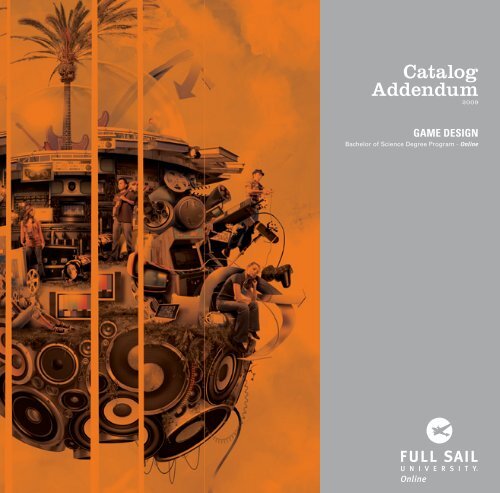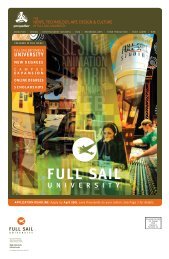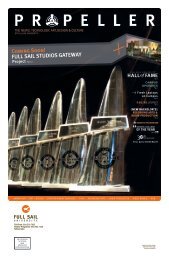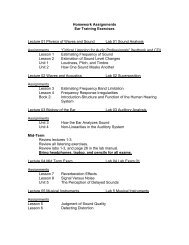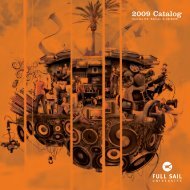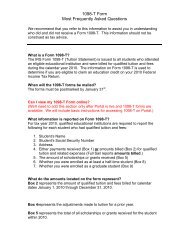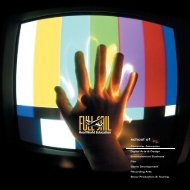Catalog Addendum - Full Sail University
Catalog Addendum - Full Sail University
Catalog Addendum - Full Sail University
- No tags were found...
Create successful ePaper yourself
Turn your PDF publications into a flip-book with our unique Google optimized e-Paper software.
<strong>Catalog</strong><strong>Addendum</strong>2009GAME DESIGNBachelor of Science Degree Program - Online
2 FU LL SAIL U NIVERSITY
AME DEVdataSTRUCTURESUNIQUEcomponentsOGRAM LANGUAGES/TERACTIVE DEVELOPMENT4 FU LL SAIL U NIVERSITYkey ALGORITHMShardwaresoftwareSYSTEMSdataSTRUCTURESPROPRIETARYgameENGINESpreproductionP R O C E S S E Skey ALGORITHMSGRAPHIC
OverviewElectronic gaming, though a relatively new form ofentertainment, derives its core from that age-oldstandard of communication: storytelling. At the heartof interactive storytelling in video games is GameDesign. <strong>Full</strong> <strong>Sail</strong>’s Game Design Bachelors DegreeProgram is designed to address the significant topicsassociated with how games create experiences thattell a story.A comprehensive examination of design processeswill address the following: social implicationsand interactions, usability, game economics, playbalancing, aesthetics and immersion, design tools,level design, prototyping, and testing. While focusingon how to design games, the program also addressesthe societal and cultural impact of electronic gamingby evaluating the psychological, sociological, andanthropological effects of games.ObjectiveOur goal is to provide you with the focused knowledgeand understanding of game design needed to qualifyfor entry-level, industry positions as game designers,lead designer, project director, cinematic designer,level designers, and other various positions in thedesign track. Additional proficiencies presented duringthe program include leadership, teambuilding, andcommunications skills necessary for the game industry.In addition to technical proficiency and creativedevelopment, your education will help you developcritical thinking, problem solving, and analytical skillsthat contribute to life learning, providing you with toolsto help sustain a long and productive professionalcareer in the entertainment and media industry.In addition to covering design and contentconsiderations, the Game Design Bachelor’s DegreeProgram also includes courses in leadership,communication, research and marketing, and otheressential business skills necessary for taking thefirst step into the video game industry. To help youmake that transition, we’ve also got a team of CareerDevelopment professionals that can help you polishyour interviewing skills and get you ready to enterthe industry. In addition, our Career Developmentservices and advisors will be available for support andassistance throughout your career – not just duringyour education.GAME DESIGNOVERVIEW & OBJECTIVEGAME DE SIGN | Bachelor o f Science Degree Program5
Game DesignBachelor of Science Degree Program - OnlinePROGRAM CORECode Course Credit HoursGDN 4340 Aesthetics and Immersion 4.0GDN 2130 Design and Development Analysis 3.0GDN 3140 Design Project 4.0GDN 3430 Design Tools I 3.0GDN 3540 Design Tools II 4.0GDN 1440 Economics 4.0GDN 4630 Final Project I 3.0GDN 4730 Final Project II 3.0GDN 4840 Final Project III 4.0GDN 1230 Game Design I 3.0GDN 4240 Game Design II 4.0GDN 1130 Game History 3.0GDN 3340 Game Mechanics 4.0GDN 2340 Leadership 4.0GDN 3630 Level Design I 3.0GDN 3740 Level Design II 4.0GDN 3240 Programming Foundations 4.0GDN 3840 Prototyping I 4.0GDN 4140 Prototyping II 4.0GDN 4540 Research and Marketing 4.0Chronological Schedule by MonthsGDN 1340 Storytelling 4.0GDN 2430 Team Building 3.0GDN 4440 Testing and Play Balancing 4.0GDN 2240 Usability 4.0Totals: 88.00GENERAL EDUCATIONCode Course Credit HoursGEN 2140 Anthropology and Sociology 4.0DEP 2004 Developmental Psychology 4.0ENC 1101 English Composition 4.0MGF 1040 Finite Math 4.0PHY 1020 Fundamentals of Physics 4.0GEN 251 Historical Archetypes and Mythology 4.0SPC 2140 Interpersonal Communication 4.0MGF 1340 Statistics 4.0Totals: 32.00TOTAL CREDIT HOURS: 120TOTAL WEEKS: 1281 2 3 4 5 6 7ENGLISHCOMPOSITIONGAME HISTORYHISTORICAL ARCHETYPES& MYTHOLOGYGAME DESIGN I FINITE MATH STORYTELLINGFUNDAMENTALSOF PHYSICS8 9 10 11 12 13 14ECONOMICSSTATISTICSDESIGN &DEVELOPMENT ANALYSISUSABILITY LEADERSHIP TEAMBUILDINGDEVELOPMENTALPSYCHOLOGY15 16 17 18 19 20 21DESIGN PROJECTANTHROPOLOGY ANDSOCIOLOGYPROGRAMMINGFOUNDATIONSGAME MECHANICS DESIGN TOOLS I DESIGN TOOLS II LEVEL DESIGN I22 23 24 25 26 27 28LEVEL DESIGN II PROTOTYPING I PROTOTYPING II GAME DESIGN IIINTERPERSONALCOMMUNICATIONSAESTHETICS ANDIMMERSIONTESTING AND PLAYBALANCING29 30 31 32RESEARCH &MARKETINGFINAL PROJECT I FINAL PROJECT II FINAL PROJECT III6 FU LL SAIL U NIVERSITY
Course DescriptionsGDN 4340Aesthetics and ImmersionGDN 3140Design ProjectGDN 3430Design Tools IGDN 1440EconomicsThe Aesthetics and Immersion Courseexamines the latest research in immersion,addiction, and basic learning theories as theyapply to game design. These techniques area growing discipline within the game designworld as they can influence sales and gameenjoyment through paradigms such as theaesthetic usability effect. This course outlinesthe constructs of aesthetics and immersionas separate yet intertwined disciplines. In thiscourse, the psychology of aesthetic design istraced back to its historic roots while also givingthe student a current understanding of the field.Course OutlineHistorical Aesthetics—Changing TimesCurrent AestheticsAesthetic TendenciesCurrent Immersion TechniquesImmersion ResearchBasic Learning TheoryReward Systems and AddictionTotal credit hours 4.0Course length4 WeeksGDN 2130Design andDevelopment AnalysisThe Design and Development AnalysisCourse teaches the student techniques usedto deconstruct, reproduce, and improve existinggames based on a thorough analytical process.The ability to critically analyze other’s work isessential to the design phase of any project, andthe video game industry is no exception to this.By playing and deconstructing games, studentswill learn the complicated design systemsrunning behind the scenes in games and willcompose documents to support their findings.Course OutlineThe Design Project Course builds on thedocumentation skills gained in Game Design Iand the critical and analytical techniques testedin courses such as Statistics, Economics, andUsability. This course challenges studentsto apply what they know. In teams, studentsgenerate ideas, design playable componentsaround those ideas, and document theirdecisions through a collaborative and analyticalprocess. Focus is placed on the mechanics,flow, and fun factor. The goal of the project isfor students to appreciate the complexity ofcollaborative game design, to fine-tune theapplication of their technical design skills, and toensure their design is well-suited to an intendedmarket and meets all milestones.Course OutlineDesign Document ReviewGame Feature BreakdownsRefactoring DesignsDesign Mechanic ReviewDesign Reviews & FeedbackIndependent WorkTotal credit hours 4.0Course length4 WeeksIn the Design Tools I Course, studentsexamine the various development tools used tocreate games. Students explore game engines,asset libraries, graphic art tools, and levelediting tools. The intention of the course is not tofine-tune the use of all the game creation toolsdiscussed; it is to provide a working knowledgeof the tools so that designers can bring theirdesigns to life as well as create a single level inan actual game engine.Course OutlineIntro to Design ToolsGame EnginesModeling & Design PackagesTexturesLevel ReviewWikisTotal credit hours 3.0Course length4 WeeksGDN 3540Design Tools IIIn the Design Tools II Course, studentstake a much closer look at the tools employedin the creation of game levels. Specifically,students are instructed in the use of stateof-the-artlevel editors employed by the gameindustry. Level editors are some of the mostimportant tools a designer will encounter inthe industry. Depending on the robustnessof the editor, a designer can create entireenvironments—complete with audio andvisual content, AI entities, and complex gameobjectives—from within the one tool. Bylearning these editors, students are betterprepared to apply the concepts they will learnin future level design courses.The Economics Course examines howpeople make choices and use resources.This course focuses specifically on gameeconomics and will examine how marketsare created and maintained in game worlds.Students will learn how players allocatetheir resources in a limited market, whiletrying to satisfy their wants and needs. Thisis maintained through economic balanceand fluctuations that are controlled by thedesigner and must be maintained throughoutthe development process. Topics of studyinclude basic economic theory, inflation,supply & demand, poverty & inequality, andmarket stability.Course OutlineReal World vs. Game EconomicsSupply & DemandMarket EquilibriumMarket Creation & MaintenanceMMO EconomiesPlayer MotivesInequality and BalanceTotal credit hours 4.0Course length4 WeeksGame Analysis TechniquesCourse OutlineGame Mechanics AnalysisReward Systems AnalysisInterface/Input AnalysisAdvanced Game Systems (Combat, etc.)Document RecreationGame EnginesLevel EditorsGeometry (Static, Dynamic, Terrain)Textures and MaterialsLightingTotal credit hours 3.0Course length4 WeeksAI/ScriptingTotal credit hours 4.0Course length4 WeeksGAME DE SIGN | Bachelor o f Science Degree Program7
GDN 2340LeadershipThe Leadership Course examines thetraits of effective, successful leadership in avariety of business situations. Communicationis a crucial skill for perspective leaders, andthe course curriculum evaluates the relatedskills essential in today’s collaborativework environments. In this course, studentswill explore active listening techniques,mentoring, and methods of matching bodylanguage to a message. Students will gainpractical experience initiating and respondingto various forms of communication and honethe skills required to be an effective motivatorand collaborator.Course OutlineLeadership TraitsLeadership Success CriteriaDefine Personal Communication StyleIdentify Perceptual FiltersActive Listening TechniquesInfluences: Persuasion, Motivation, andInspirationPresentation/Communication TechniquesTotal credit hours 4.0Course length4 WeeksGDN 3630Level Design IThe Level Design I Course teachesstudents how to analyze game levelsand break them down into their basiccomponents. Students will learn to ask theright questions when designing a level. Whatpurpose does a particular object in a levelserve? Is it functional, or is it there for purelyaesthetic reasons? What sort of guidance (ifany) should a player receive? Does this levelhave any ties to previous or future levels?Students will also learn about such conceptsas level pacing and flow, setting clear goalsfor a player, and the importance of visuals.The ever-elusive fun factor will also becovered, as a way of tying the individualcomponents together.Course OutlineLevel Purpose and ThemeLevel Goals and ObjectivesPacing and FlowPlayer Navigation and RewardsAesthetics and VisualsTotal credit hours 3.0Course length4 WeeksGDN 3740Level Design IIThe Level Design II Course teaches studentshow to create a level based on game interactionsand features. Designing a level by interactionallows the game designer to map out theperfect game scenarios to give to the player.Since games allow a degree of free will, it is thedesigner’s responsibility to present the playerwith optimal situations to utilize and mastergame features. This is achieved by linking wellthought out interactive scenarios. Using thetools learned in Level Design 1, students followsimple steps to creating an interaction-drivenlevel. Advanced concepts such as modularity andcombat scenarios are also covered in this class.Course OutlineDefining Game InteractionsMapping InteractionsLevel Creation with InteractionsFacilitating ScenariosCreating ModularityTotal credit hours 4.0Course length4 WeeksGDN 3240Programming FoundationsThe Programming Foundations Courseexamines the underlying technical detailsof a game. General knowledge of simpleobject-oriented concepts will help adesigner plan out the various systems of agame. These skills will also help a designerbreak down aspects of a game into theircore components. Scripting languages willalso be introduced as a means of giving thedesigner higher-level access to the data andfunctionality of a game.Course OutlineIntroduction to VariablesInformation Storage and Retrieval SystemsObject Oriented Programming Languages(Java, C#)Scripting (Python, Lua)Core Game ElementsTotal credit hours 4.0Course length4 WeeksGDN 3840Prototyping IThe Prototyping I Course providesstudents with the theory and practices usedto design and execute a testing process toboth validate and improve a game duringthe preproduction phase of development.Simplified versions of the final productcalled prototypes allow for the proving andrefinement of a game as well as reducingboth costs and risks associated with theactual development cycle. Students willultimately propose their own product in thiscourse to be tested in the following course,Prototyping II.Course OutlineProcess: From Concept to Prototype toPreproductionMaterial ModelsLevels of FidelityBug-Tracking PlanDefect DeterminationTesting MethodologiesTotal credit hours 4.0Course length4 WeeksGDN 4140Prototyping IIThe Prototyping II Course demonstratesthe testing of viability and variation ofthe game concept, employing a heuristicprocess that provides personal insight foreach student. This course utilizes the gameconcept proposed in the previous course(Prototyping I) to experience a testing andrevision process that will improve the overallquality of a game. A range of testing methodswill be employed to improve iterations of thegame product.Course OutlineExecution of Test MethodsIterative DesignTracking Software ConfigurationBug Tracking and AllocationIntegrating Experience into thePreproductionTotal credit hours 4.0Course length4 WeeksGDN 4540Research and MarketingThe Research and Marketing Courseexamines the marketing process and helpsstudents develop the skills required to gatherinformation, organize data, and deliver a conciseand credible product. The billion-dollar videogame industry is fueled by successful marketingcampaigns that engage loyal enthusiasts as wellas capture new customers. Topics of study willinclude consumer research, advertising, productplanning, distribution, public relations, and mediarelationships. The materials and process in thiscourse apply directly to final project developmentin this program.Course OutlineMarketing OverviewGame MediaGame and IP BrandingMatching Games and MarketsESRB RatingsCommunity & Forum RelationsReviews and RankingsTotal credit hours 4.0Course length4 WeeksGAME DE SIGN | Bachelor o f Science Degree Program9
Course DescriptionsGDN 1340StorytellingThe Storytelling Course introducesstudents to the history of storytelling in all itsmanifestations: from ancient tribal performanceand cave paintings to the modern impact ofstory in various entertainment media. Studentswill examine storytelling as a practical toolfor communicating information and ideas,including storyboarding techniques. There willbe particular attention paid to how storytellingoperates through modern technologies includingcinema and games and how it can be used invideo games to build narrative depth, emotionalimpact, and theme, which all work towardgreater player immersion.Course OutlineHistory of StorytellingNarrative PatternsStorytelling TechniquesDramatization & Character RelationshipsStorytelling & TechnologyTotal credit hours 4.0Course length4 WeeksGDN 2430Team BuildingThe Team Building Course investigatescollaborative techniques designed to inspireteams to work together, delivering fasterand more effective results and services.A strong team demonstrates critical skillsin assessing and managing relationshipswith self and others. This course seeks tomaximize individual strengths; leveragecomplementary skills and styles of teammembers; and optimize organization,planning, and implementation of teamobjectives. Through self-reflection andteam-building exercises, students will learnto structure, measure, and tune performancein a team environment.GDN 4440Testing andPlay BalancingThe Testing and Play Balancing Courseprovides students with the skills used to designand implement a testing program from thebeginning of the development cycle to the end.Quality Assurance is an integral componentof the game design process. The successfuldelivery of a game is dependent on theverification and validation of an effective qualityassurance system. Topics will include functionprototypes, test sets (which include defecttesting and acceptance testing) and structuralprototyping. Students will develop a continuousprocess improvement program that can beutilized in future projects.Course OutlineBug-Tracking PlanDefect DeterminationTracking Software ConfigurationPrototypingGame TestingBug Tracking and AllocationTotal credit hours 4.0Course length4 WeeksGDN 2240UsabilityThe Usability Course explores the theoreticaland practical methods used to improve gameinterfaces. Usability inspection is aimed atfinding usability problems and providing designrelevantinformation to designers and engineersin the effort of making products easier tointeract with and more efficient to use. In thiscourse, students will understand usabilityand its considerations defining the usabilitytrade-offs involved in the game design world.Some of the topics shall include generationsof user interfaces, the usability engineeringlifecycle, usability heuristics, and usabilitytesting methodologies.Course OutlineWhat is Usability?Generations of User InterfacesEngineering LifecycleHeuristicsTestingAssessment Methods Beyond TestingStandardsTotal credit hours 4.0Course length4 WeeksGeneral EducationGEN 2140Anthropologyand SociologyIn the Anthropology and SociologyCourse, students investigate the study ofhumanity, how groups of humans tend tointeract, and the impact of these interactionson the individual. Technology has changedthe shape of communication and commerce,creating the potential for a truly globaleconomy. Understanding how culture isshaped—from the largest national identitiesto the smallest social groups—has becomean absolute necessity for industries hopingto tap into broader world markets.Course OutlineIntroduction to AnthropologyCultural AnthropologyIntroduction to SociologyGroup DynamicsSocial PsychologyTotal credit hours 4.0Course length4 WeeksDEP 2004Developmental PsychologyThe Developmental Psychology Courseexamines the ways the basic elements ofpsychological development serve to eitherdetract from or enhance personal growth.Students gain a basic understanding ofdevelopmental theories and identify ways thatthey impact personal growth. Current theory iscombined with historical theory in order to givethe students the broadest possible frameworkwith which to enhance their understanding ofdevelopmental psychology.Course OutlineParadigmsCourse OutlineProactive and Reactive BehaviorPersonality Types and How to Respondto ThemEfficacy, Shadow, ShameCognitive DissonanceTeam Development StagesImagination and ConscienceTeam Ground Rules, ObjectivesTime ManagementTeam Identity and VisionPerception and CommunicationRoadblocks, Feedback, & MeasurementsTotal credit hours 3.0Course length4 WeeksTotal credit hours 4.0Course length4 Weeks10 FU LL SAIL U NIVERSITY
ENC 1101English CompositionThe English Composition Course isdesigned to help students refine their ownwriting processes while developing anin-depth personal and intellectual inquiryinto a subject of their choosing. The courseconnects personal reflection with criticalanalysis, providing varied opportunitiesfor writing and for strengthening languageskills. As the course unfolds, a series ofassignments leads students through acontinually deepening creative researchprocess, which then develops into a complexand detailed written project.Course OutlineComposition and RevisionCritical AnalysisLiterary DevicesGrammar and StructurePortfolioTotal credit hours 4.0Course length4 WeeksMGF 1040Finite MathThe Finite Math Course provides afoundation of mathematical analysis techniquesused in the working world. Students will explorea collection of topics including ProbabilityTheory, Linear Programming, Matrices &Determinates, Logic, and Number Theory. Thetopics explored will provide valuable experiencewith organizing information and analyticalthinking. Students will use the skills gainedin this course to successfully navigate futurecourses and projects that call on logical andanalytical assessments.Course OutlineAlgebraic OperationsLogic & Probability TheoryLinear ProgrammingMatrices & DeterminantsCombinatoricsSets & Number TheoryDigital GeometryProofs and Ordered SetsTotal credit hours 4.0Course length4 WeeksPHY 1020Fundamentals of PhysicsThe Fundamentals of Physics Courseexamines real-world physics and how thoserules can be modeled in mathematicaltheories. Students will explore thefundamentals of momentum and energy,force and motion, gravity, particles,temperature, electricity, magnetism, andlight. Students will use the learned conceptsto design mathematical models representingthe physics environments. The studentswill use this knowledge to communicateconcisely the behavioral characteristics ofthe natural phenomena.GEN 251Historical Archetypesand MythologyThe Historical Archetypes and MythologyCourse explores how myths, fairytales,folklore, gods, heroes, and monsters linkcultures together historically and how theyshape and influence today’s world andmarketplace. The course topics are examinedthrough a combination of the theories ofJoseph Campbell, Jungian psychology,and various literary theories. The classprovides a foundation for understanding theconnections between culture, mythology,color symbolism, iconic archetypes, andhistory—all of which are vital in creativityand imagination.Course OutlineIntroduction to Archetypes, Culture, &MythsShamanism and Creation MythsCeltic & Norse Mythology and ArchetypesAsian Mythology and ArchetypesGreek Mythology and ArchetypesMiddle Eastern Mythology and ArchetypesArthurian Legends and ArchetypesMyths & Archetypes in ContemporaryMediaTotal credit hours 4.0Course length4 WeeksSPC 2140InterpersonalCommunicationThe Interpersonal Communications Course isdesigned to provide strategies and skills toenable clear and professional communicationsin the workplace. The students are guidedthrough the career planning process andare provided with strategies necessary for alifetime of career-related decision-making. Byestablishing clear goals and a clear approachfor attaining those goals, students will increasetheir own self-confidence with respect to thetransition from student life to professional life.Course OutlineAssessment and EvaluationResearch and PlanningWriting Resumes and Other DocumentsNetworking and InterviewingTotal credit hours 4.00Course length4 weeksMGF 1340StatisticsThe Statistics Course teaches studentshow to examine data, determine wherethings are, and predict where things will go.By determining market trends and behavioraltrends, the student can leverage the data sothat it connects directly with an intendedtarget. Students will examine the centraltendency, variability, and skew of data ineffort to locate correlations and regressionsand will use this information to predicttrends or see where problems could arise.Course OutlineCourse OutlineDescriptive Statistics & Data CollectionNomenclatureMathematics of StatisticsNewtonian PhysicsProbability & DistributionBasic Collision DetectionCentral Limit TheoremBasic Collision ReactionMean & VarianceApplication of PhysicsStatistical Analysis & ApplicationTotal credit hours 4.0Course length4 WeeksTotal credit hours 4.0Course length4 WeeksGAME DE SIGN | Bachelor o f Science Degree Program11
AdmissionsRequirements for AdmissionApplicants must submit the following to be considered for admission:• Application for Admission – Applicants must submit thecompleted application and fulfill all the requirements therein.• $75.00 application fee – The application fee must be submittedwith the application. The application and application fee maybe submitted prior to submission of the following supportingdocuments.• Official Final High School Transcript, or GED test scores—GED mustbe approved by your state’s Department of Education.»»<strong>Full</strong> <strong>Sail</strong> requires that all applicants have completed highschool and received a standard high school diploma orhave passed the GED. High school seniors may still applywith official high school transcripts. Accepted applicantsmust provide their official final high school transcript beforebeginning any degree program.»»Transcripts must be sealed and may be included withthe application or sent directly from the high school to<strong>Full</strong> <strong>Sail</strong>’s Enrollment Department.»»Official GED test scores are required to prove highschool equivalency.»»Home-schooled applicants are asked to provide home-schooltranscripts with the date of completion along with verificationthat the home school has been recognized by the applicant’sstate of residence.• One Letter of Recommendation— At least one letter shouldbe written by a teacher, guidance counselor, employer orcommunity leader. A second letter is recommended, and ispreferred to be from the above, but may be a personal letterwritten on behalf of the applicant (but should not come from afamily member). These letters should address the applicant’scharacter, motivation, creativity and academic achievement.• Application Questionnaire— The applicant must submit thecompleted questionnaire which is designed to provide furtherinsight into the applicants career dreams and goals.NOTE:ALL REQUIRED DOCUMENTATION THAT IS NOT IN ENGLISH MUST BE ACCOMPANIED BYA CERTIFIED ENGLISH TRANSLATION. IF NATIVE LANGUAGE IS OTHER THAN ENGLISH,VERIFICATION OF LANGUAGE PROFICIENCY IS REQUIRED.International ApplicantsInternational applicants must meet the standard admissionrequirements and provide the following:• Language Proficiency - Applicants whose native language isnot English must demonstrate the required level of languageproficiency by providing documentation of one of the following:TOEFL (Test of English as a Foreign Language)»»Paper and pencil test: minimum score accepted is 550»»Computer-based test; minimum score accepted is 213»»New internet-based test; minimum score accepted is 79IELTS (International English Language Testing System)»»The minimum required score is 6• Financial Guarantee - must be provided to verify available fundingfor tuition and related expenses for the duration of the chosendegree program.• Foreign School Credentials - must be submitted to an outsideevaluation service for determination of U.S. equivalency. Pleasecontact your Admissions Representative or an InternationalLiaison for recommended evaluation services.• English Translation - any documentation not in English must beaccompanied by a certified English translation.In an effort to minimize costs due to international currency exchangeand bank surcharges, a wire transfer or a credit card is recommendedfor payment of all fees, deposits and tuition for International applicantsand students. Regardless of payment method, all fees must be paid inUnited States currency. Please contact <strong>Full</strong> <strong>Sail</strong>’s International Liaisonfor details.NOTE:REQUIREMENTS FOR ADMISSION APPLY EQUALLY TO ALL APPLICANTS WITHOUT REGARDTO RACE, COLOR, NATIONAL ORIGIN, SEX, DISABILITY, AGE, SEXUAL ORIENTATION, ORMARITAL STATUS.Information regarding Services for Students with Disabilities in theclassroom can be found in the <strong>Full</strong> <strong>Sail</strong> <strong>Catalog</strong>.Admission Application ProcessThe Admissions Department is prepared to assist with completingthe application process. To apply simply:• Complete the Application for Admission.• Submit completed application along with $75 application fee.• If applying for additional degree programs, a $200 deposit isrequired for each additional program.Applicants will be notified in writing in regards to acceptanceupon completion and review of all required documents. Theapplication fee and deposit(s) are credited to the cost of tuitionbut are not covered by financial aid. All deposits are fully refundable.12 FU LL SAIL U NIVERSITY
Degree Program PriceBachelor of Science Degree ProgramGame DesignEnrollment Period 1 $11,000Enrollment Period 2 $15,000Enrollment Period 3 $16,000Enrollment Period 4 $12,000Total Price $54,000Degrees AwardedUpon completion of the degree program, the student will be awardeda Game Design Bachelor of Science degree.What’s IncludedThe cost of a <strong>Full</strong> <strong>Sail</strong> Degree Program includes expenses such astextbooks, manuals, media, production materials, lab fees,technology fees, and other associated costs except as noted.Institutional FeesStudents will incur an additional fee (separate from tuition) for thecost of a computer and software, and equipment configured inaccordance with program specifications which will change from timeto time. Computer, software, and equipment prices and specificationswill vary depending on degree program, start date, availability, andmanufacturer changes. Please consult your Admissions Representativefor information about the current institutional fee per degree program.Fees/DepositsA $75 application fee is required to apply for a Degree Program.For those applying for a second, or multiple degrees, an additional$200 refundable deposit is required.The application fee and deposit(s) are not covered by financial aid.The application fee and deposit(s) are included in the tuitionprices listed.Non-Sufficient FundsA $25 fee will be charged for any check returnedfor non-sufficient funds.Online Education at <strong>Full</strong> <strong>Sail</strong>Online degree programs and courses are delivered over the <strong>Full</strong> <strong>Sail</strong>Online Learning Environment—a secure web-based platform thatemploys modern multimedia technologies and is accessible 24 hoursa day via the Internet. Online students use this system to view videocontent, receive and submit project work and assignments, take testsand quizzes, communicate with instructors and classmates,and review grades and course progress.On-campus students also use <strong>Full</strong> <strong>Sail</strong>’s Online learning systemfor online-only courses, which are notated in their respectivedegree sections.Policies & Procedures – Online ExceptionsMost of the information in this catalog is applicable to both oncampusand online applicants. However, there are a few exceptionsfor online students, which are noted below:Institutional FeeOnline students living outside the continental United States will incuran additional fee for the cost of shipping their computer, software,equipment, and educational materials configured in accordance withtheir degree program specifications, which will change from timeto time. This shipping fee to students living outside the continentalUnited States will be separate from tuition and in addition to the costof the computer, software and equipment specific to their degreeprogram. The shipping fee may vary depending on theonline student’s place of residence.RequirementsApplicants to online-only degree programs will be required tocomplete an online orientation and assessment module. Theassessment module confirms that the applicant has received sufficientinstruction and information from the orientation module. The moduleexplains the best practices for conducting online learning, overalloperation of the online platform, procedures for troubleshootingproblems and contacting the technical support team, and generalschool policy as it applies to the online format.Online SupportThe staff of <strong>Full</strong> <strong>Sail</strong> Online Support works together with students,faculty, and administration to make the student experiencepositive, reassuring, and seamless throughout our online coursesand degree programs.Our mission is to provide the highest standard of technical supportand to nurture students’ growth and development while allowingthem to enhance the skills necessary to be successfulin an online environment.<strong>Full</strong> <strong>Sail</strong> Support Specialists can assist with resolving technical issuesassociated with the functionality of the online platform. Supportspecialists are available either by phone or email, Monday throughFriday 8am – 10pm, Saturday 3pm – 10pm, and Sunday 5pm – 12amEastern Standard Time. Students can contact Online Support withthe understanding that their concerns will be addressed promptlywithin 24 hours and communicated to the appropriate party. Youcan reach Online Support by phone at 877-437-6349 or by email atFSOSupport@fullsail.com.Degree Program PricingGAME DE SIGN | B a c helor o f S c ience Degree Program13
Policies & ProceduresOnline Education at <strong>Full</strong> <strong>Sail</strong>, cont.Graduation RequirementsIn order to receive a Bachelor of Science Degree from <strong>Full</strong> <strong>Sail</strong>’s OnlineDegree Program, a student must:1. achieve a minimum GPA of 1.0 in each course,2. complete all applicable courses within the degree,3. not accrue in excess of 1.5 times the credits required tocomplete the program,4. achieve an overall cumulative GPA of 2.0, and5. fulfill all financial responsibilities.Class Times & SchedulesOnline students may log in to their courses and assignments atany hour and day they choose provided they meet all assignmentdeadlines. <strong>Full</strong> <strong>Sail</strong> reserves the right to adjust the order of coursesand program content, staff or materials on a course-by-course basisas needed.AttendanceAs online students do not attend class on <strong>Full</strong> <strong>Sail</strong>’s campus,their attendance is based on participation and timely completionof assignments.Refund and Repayment PolicyRefunds<strong>Full</strong> <strong>Sail</strong> provides refunds in accordance with current state and federalregulations, and applicable accrediting standards. Refunds may resultfrom either the federal Return to Title IV Refund calculation or the <strong>Full</strong><strong>Sail</strong> Refund and Repayment Policy.The following categories of applicants are entitled to a full refundincluding the new application fee:1. an applicant rejected by the college,2. an applicant canceling application within five (5)business days of <strong>Full</strong> <strong>Sail</strong>’s receipt of the applicationfee,3. an applicant canceling enrollment within five (5)business days of <strong>Full</strong> <strong>Sail</strong>’s receipt of a signedenrollment agreement, an applicant who cancelsenrollment within five (5) business days after eithersuccessful completion of orientation or following a tourof the school facilities and inspection of equipmentwhere training and services are provided, and4. a student enrolled in the first enrollment period of thedegree program who is dissatisfied with his or herprogress and withdraws within the first five (5) days ofinstruction.Under any other circumstances, the $75 application fee is retainedby <strong>Full</strong> <strong>Sail</strong>. Percentages of refunds are based on 100 percent of thecontract price including the deposit.A student who is terminated, withdraws, or otherwise fails to completehis or her course of study may be eligible for a refund.Repayment of Government Program FundsIf a student is terminated, withdraws, or otherwise fails to completean enrollment period and received financial aid while enrolled, theFederal Government dictates how refunds (if applicable) are repaid.The return of financial aid is dictated by The Return of Title IV Fundscalculation policy. If a refund results from this calculation, federalpolicy requires that these unearned funds be returned to theapplicable Title IV financial aid fund source.Funds are refunded to the Title IV Programs in the following federallymandated order:1. Unsubsidized Federal Stafford loans2. Subsidized Federal Stafford loans3. Federal PLUS loans4. Federal Pell grants5. Academic Competitiveness Grant (ACG)6. National Science and Mathematics Access to RetainTalent (SMART)7. Federal Supplemental Education Opportunity Grant(FSEOG)8. Other grant or loan assistance authorized by Title IV ofthe HEA, as amendedWhen a student withdrawal involves the repayment of Title IV funds,<strong>Full</strong> <strong>Sail</strong> returns these funds based upon a federally recognizedpayment period. <strong>Full</strong> <strong>Sail</strong>’s federally recognized payment period isdefined as half of an academic year.If a student withdraws on or before completing sixty (60%) of thefederally recognized payment period (defined above), a portion ofthe total Title IV funds awarded will be returned. The Return of Title IVFunds calculation may result in the student owing a balance to theFederal Government and, in some cases, to <strong>Full</strong> <strong>Sail</strong>.Refunds are made within thirty (30) days of termination or withdrawal.Living Expense RepaymentIf a student is provided with living expense funds originating from astudent financial assistance program and the student fails to completethe enrollment period for any reason, the student is required to returnthe unearned funds. <strong>Full</strong> <strong>Sail</strong> will notify the student of the amountowed. If the student fails to satisfy the repayment, he or she will beineligible for any further federal student financial aid assistance.14 FU LL SAIL U NIVERSITY
Refund Chart<strong>Full</strong> <strong>Sail</strong> calculates a pro-rated refund for all students who do notcomplete thirty (30) percent of an enrollment period. Refunds arecalculated by determination of the number of weeks of instructionattended by the student and dividing this figure by the total weeksof instruction required to complete the enrollment period. Theresulting percentage is rounded up to the nearest ten (10) percentas the amount of the enrollment period the student has completed.The amount of tuition to be refunded is based on the amount of theenrollment period completed and is illustrated in the chart below.Comparative Program InformationComparative program information related to tuition and program lengthis available from:»»Accrediting Commission of Career Schoolsand Colleges of Technology2101 Wilson Boulevard, Suite 302Arlington, VA 22201(703) 247-4212% ENROLLMENT PERIOD COMPLETED % CONTRACT PRICE REFUNDED1-10%.. . . . . . . . . . . . . . . . . . . . . . . . . . . . . . . . . . . . . . . . . . . . . . . . . . 90%10.1%-20%. . . . . . . . . . . . . . . . . . . . . . . . . . . . . . . . . . . . . . . . . . . . . 80%20.1%-30%.. . . . . . . . . . . . . . . . . . . . . . . . . . . . . . . . . . . . . . . . . . . . 70%30.1%-100%.. . . . . . . . . . . . . . . . . . . . . . . . . . . . . . . . . . . . . . . . . . . . 0%Using the percentage completed as calculated in the chart above,cancellation after attendance has begun but prior to thirty (30) percentcompletion of the enrollment period will result in a pro-rated refund.Please note that after a student completes over thirty (30) percentof an enrollment period, he or she is responsible for one hundred(100) percent of the tuition for that enrollment period. The date fromwhich the refund is calculated is either the date of the student’s formalwithdrawal or the date <strong>Full</strong> <strong>Sail</strong> terminated, withdrew, or otherwisedetermined a student failed to complete his or her course of study.Refunds are made within thirty (30) days of termination orwithdrawal. The original source of any refunded amounts dictatesthe entity to which funds are returned. Refunds due to the studentthat are less than two dollars are not issued unless the studentsubmits a written request.In the event of a student’s prolonged illness, accident, death in thefamily or other circumstances that make completion of the enrollmentperiod impossible or impractical, the school will attempt to make a fairand reasonable settlement.<strong>Full</strong> <strong>Sail</strong> reserves the right to modify these policies in order toremain in compliance with any changes in the applicable lawsand regulations.Produced by Platinum Creative©2009 <strong>Full</strong> <strong>Sail</strong>, Inc. All rights reserved.The terms “<strong>Full</strong> <strong>Sail</strong>,” “<strong>Full</strong> <strong>Sail</strong> <strong>University</strong>,” “<strong>Full</strong> <strong>Sail</strong> Real World Education,” “If you’reserious about your dream, we’ll take your dream seriously,”“You Can Get There FromHere,” and the <strong>Full</strong> <strong>Sail</strong> <strong>University</strong> Logo are either registered service marks or servicemarks of <strong>Full</strong> <strong>Sail</strong>, Inc.Other product and company names mentioned herein may be the trademarks of theirrespective owners. The appearance of these marks does not necessarily indicate a formalizedsponsorship or affiliation with other such companies.GAME DE SIGN | Bachelor o f Science Degree Program15
Master’s | Bachelor’s | Associate’s Degrees<strong>Full</strong> <strong>Sail</strong> <strong>University</strong>3300 <strong>University</strong> BoulevardWinter Park, FL 32792-7429Toll Free: 888.993.7338Local/International: 407.679.6333fullsail.edu<strong>Catalog</strong> <strong>Addendum</strong>2009Accredited <strong>University</strong>, ACCSCT. Financial Aid available to those who qualify. Career development assistance.


